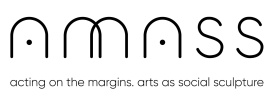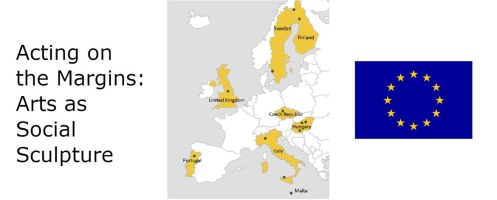AMASS - Acting on the Margin - Arts as a Social Sculpture

Grant agreement ID: 870621
Coordinated by: LAPIN YLIOPISTO, Finland (Universtiy of Lapland)
Start date: 1 February 2020
End date: 31 January 2023
Kickoff: 24-25 February 2020 (Quinta de Cruz, Viseu) Report from Kick-Off Meeting
Art exhibittion Decemmber 2021 (Msida, Malta)Event web
Oficiální web: https://amassproject.weebly.com/czech-republic.html
Art Department web: https://kvv.pedf.cuni.cz/KVV2-178.html


Participants:
|
- University of Lapland |
Finland | |
|
- Associacaão de Professores de Expressão e Communicacão Visual (APECV) |
Portugal | |
|
- Universita ta Malta (Joint applicant) |
Malta | |
|
- Textilhögskolan, Högskolan i Borås (Joint applicant) |
Sweeden | |
|
- Budapesti Corvinus Egyetem (Joint applicant) |
Hungary | |
|
- PACO Design Collaborative (Joint applicant) |
Italy | |
|
- University of Leeds (Joint applicant) |
UK | |
|
- Charles University, Faculty of Education (Joint applicant) |
Czech Republic |
Main participant's project website
Objective
The central problem AMASS addresses is that the arts has not been harnessed to address societal challenges through comparative and European-wide Research Innovation Action (RIA), analysis, synthesis and policy development. This untapped potential of the arts undermines joint action between different artistic genres and geographic locations, and thus the advancement of the EU as a stronger global actor, the fostering of fundamental rights based on mutual trust and democratic change within the EU. The overall objective of the project is to address this European-wide lack of synthesis of the potential of the arts that can lead to generating alternative or unconventional solutions to societal challenges and policy development. The aims thus will be to discover and analyse the underpinning structures that influence the functioning of arts in societal challenges (specifically SC6) through arts-based RIA. The challenges addressed by AMASS are geopolitically oriented: the future of work in creative, cultural and other sectors; radical ideologies and extremism; societal polarisation and stratification; lack of civil society participation; populism; migration. Thus, this project will identify, explore, collate, evaluate and analyse existing and new innovative productions, experiments and case studies from the perspective and the physical positioning of the European countries “on the margins”. AMASS, which is located in Europe’s culturally often underserved Northern, Southern, Western and Eastern regions, will set up 5 experiments in these peripheries to investigate the educational effects of the STEAM model in integrating the arts with science through participatory and multidisciplinary approaches. This will be accomplished through technologically enabled visual expression and problem-based learning that will offer solutions to the geopolitical challenges, and policy recommendations and development that will foster inclusive, innovative and reflective societies.
Programme(s)
The central problem AMASS addresses is that the arts has not been harnessed to address societal challenges through comparative and European-wide Research Innovation Action (RIA), analysis, synthesis and policy development. This untapped potential of the arts undermines joint action between different artistic genres and geographic locations, and thus the advancement of the EU as a stronger global actor, the fostering of fundamental rights based on mutual trust and democratic change within the EU. The overall objective of the project is to address this European-wide lack of synthesis of the potential of the arts that can lead to generating alternative or unconventional solutions to societal challenges and policy development. The aims thus will be to discover and analyse the underpinning structures that influence the functioning of arts in societal challenges (specifically SC6) through arts-based RIA. The challenges addressed by AMASS are geopolitically oriented: the future of work in creative, cultural and other sectors; radical ideologies and extremism; societal polarisation and stratification; lack of civil society participation; populism; migration.
This project will identify, explore, collate, evaluate and analyse existing and new innovative productions, experiments and case studies from the perspective and the physical positioning of the European countries “on the margins”. AMASS, which is located in Europe’s culturally often underserved Northern, Southern, Western and Eastern regions, will set up 35 experiments in these peripheries to investigate the educational effects of the STEAM model in integrating the arts with science through participatory and multidisciplinary approaches. This will be accomplished through technologically enabled visual expression and problem-based learning that will offer solutions to the geopolitical challenges, and policy recommendations and development that will foster inclusive, innovative and reflective societies.
PedF CUNI is part of the WP3 (Work package 3) and it's deliverables stated by the consortium of AMASS, Horizon 2020.
Aims
Developing multidisciplinary methods for capturing, assessing and harnessing the societal impact of the arts
Reducing isolation amongst women, children and minority groups from peripheral EU regions through various forms of participation in the arts
Educating women and children through various educational models and philosophies of participation that are informed by arts-based approaches
Evaluate and develop new policy frameworks for using arts to overcome societal challenges
Valuing and learning through alternative knowledge systems with the purpose of decolonising institutions, enable communication and implement policies
Expected Results
Culturally marginalised and / or socially underprivileged groups will express their problems and collaborate on finding solutions through innovative arts education practices. Artists and art educators will be sensitised for and gain experience in catalysing social and educational empowerment. New methodologies developed will be used in their future educational and artistic work.
Tackle exclusion and various forms of poverty by formulating, experimenting with and testing innovative art-based practices aimed at mutual understanding, dialogue and civic participation.
Prioritise, recognise and promote the value of creativity within the peripheries of Europe. Acknowledge creative potentials and act on creative opportunities. Render audible and visible the voices from positions of marginality.
The integration of the arts in the strategic overall and regional goals and policy making processes of the EU that relates to the fight against exclusion, tackling a variety of poverty issues (cultural, educational, skills and so on), and youth unemployment.
This project has received funding from the European Union's Horizon 2020 research and innovation programme under the European Union's Horizon 2020 research and innovation programme under grant agreement No 870621.
Topic: TRANSFORMATIONS-17-2019 - Societal challenges and the arts
Call for proposal : H2020-SC6-TRANSFORMATIONS-2019
See other projects for this call
Funding Scheme: RIA - Research and Innovation action
PedF CUNI participants/active years in project:
|
|
research assistant |
2020 - 2023 |
|
|
|
project lead |
2020 - 2023 |
|
|
|
|
research assistant |
2020 - 2023 |
|
|
project coordinator, researcher of psychology department PedF CUNI |
2020 - 2023 |
|
|
Mgr. Kristýna Říhová |
administrative coordiantor |
Oct 2021 - 2023 |
|
|
Mgr. Lucie Jakubcová Hajdušková, Ph.D. |
researcher, action research, media communication |
Oct 2021 - 2023 |
|
|
Mgr. Vendula Fremlová, Ph.D. |
curator, researcher/Roma art |
Oct 2021 - 2023 |
|
|
Mgr. Zuzana Fišerová, Ph.D. |
researcher, research methods, data manager |
Oct 2021 - 2023 |
|
|
PhDr. Mgr. Marek Merhaut, Ph.D., MBA |
researcher, sociologist |
Oct 2021 - 2023 |
2LF CUNI participants:
|
PhDr. Jaroslava Raudenská, Ph.D. |
|
research assistant |
2020 - 2022 |
|
PhDr. Alena Javůrková, Ph.D. |
|
research assistant |
Oct 2021 - 2022 |
Outputs: https://amassproject.weebly.com/dissemination.html